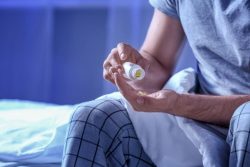Sleeping Pills and Sleep Apnea: What You Should Know
May 5, 2023
Most people suffer from an occasional inability to fall asleep, while some individuals have to cope with chronic insomnia. In addition, a number of those people also have obstructive sleep apnea (OSA). Together, these two problems can create conditions that make it impossible to get an adequate amount of rest.
If you suffer from OSA and insomnia, you might be tempted to try sleeping pills to help you get some shuteye. But is that wise? What is the relationship between sleeping pills and sleep apnea? Continue reading to find out.
How Sleeping Pills Affect Sleep Apnea
Most sleeping pills that you can buy over the counter, including popular options like Tylenol PM, ZzzQuil, and generic brands, contain diphenhydramine. Diphenhydramine is a type of antihistamine. It blocks certain receptors in the brain that play a role in wakefulness. Hence, these medications can help people drift off to sleep.
While that might sound appealing at first, there is a major caveat to keep in mind. Diphenhydramine causes muscles throughout the body to relax. That includes the muscles in your throat that can block your airway and lead to apneas (episodes of not breathing). Hence, while sleeping pills may help you to fall asleep, they can interfere with the quality of your sleep. You may wake up without feeling refreshed at all.
What about melatonin? It is a natural supplement that promotes sleep. Unfortunately, it is not recommended for sleep apnea sufferers. Just like pills that contain diphenhydramine, it promotes muscle relaxation and may worsen OSA symptoms.
Improve the Quality of Your Sleep without Medication
Since you should avoid sleeping pills, it is worth investing other avenues that may help you fall asleep and enjoy high-quality sleep. Here are a few practical suggestions:
- Talk to your doctor. A doctor may recommend that you undergo a sleep test to get a better understanding of why you are not getting the rest you need. From there, they can recommend an appropriate treatment. Perhaps you would benefit from an oral appliance to promote proper breathing while you sleep.
- Get out of bed for a while. If you are find it difficult to fall asleep, get out of bed for a while. Many people find that keeping themselves busy until they feel drowsy is helpful
- Create a good sleep environment. You should have a high-quality mattress, pillow, and bed linens. Your bedroom should be slightly cool at night. It should also be as clean as possible.
- Care for your mental health. If anxiety, depression, or other forms of emotional distress are making it difficult for you to sleep, you may need to visit a mental health professional.
Sleeping pills might seem like a convenient way to get more rest, but they are usually not helpful for individuals with OSA. Finding other ways to fall asleep and stay asleep is the wiser course of action.
Meet the Sleep Apnea Expert
Dr. Kenneth Mogell is double board-certified in dental sleep medicine. He specializes in helping patients find better rest with the help of oral appliance therapy. If you are concerned about the quality of your sleep, he and our team would be happy to help. Contact our Melbourne office at 844-686-0696.
